115 - In The Pink
Thursday, August 28, 2014
All around are happy people, pink people, spotty dresses, and an ambience. An inexplicable ambience, of people with nothing to do but enjoy themselves.
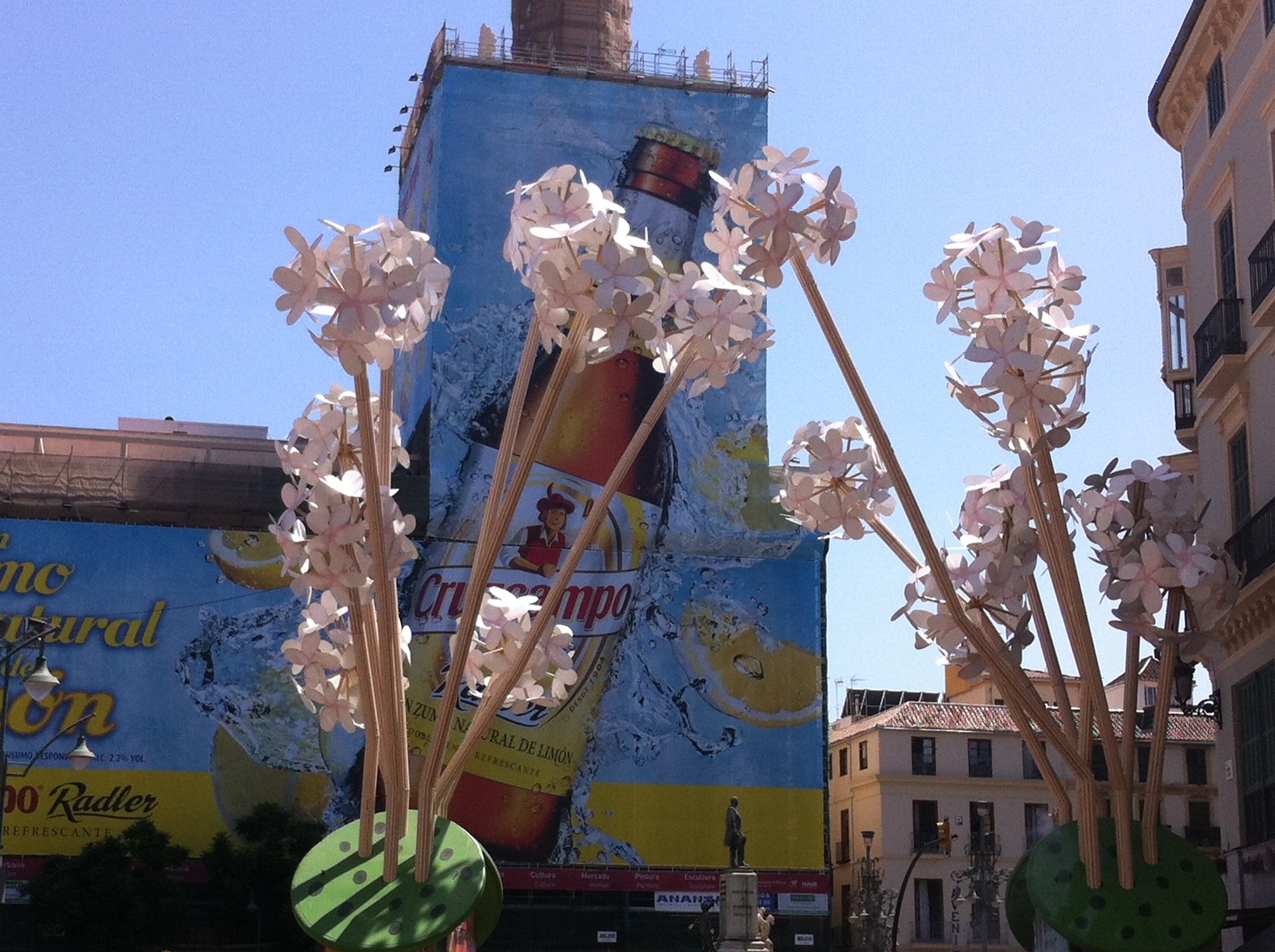 What was striking this year about Málaga feria is that it is nothing more than that, yet that in itself is more than enough. In the city from some unspecific time before lunch, until exactly 7pm, it is feria. And everybody is taking part. Everybody knows what to do. You wander the streets, join a crowd watching some spontaneous flamenco dancing or a group of singers, you wander on, you sit awhile outside a bar watching happy people, pink people, wandering by. You pick at some tapas, and you wander on. You buy hair decorations from a street vendor. You thrown coins in a hat for a man on stilts, or a trio of music students. What was striking this year about Málaga feria is that it is nothing more than that, yet that in itself is more than enough. In the city from some unspecific time before lunch, until exactly 7pm, it is feria. And everybody is taking part. Everybody knows what to do. You wander the streets, join a crowd watching some spontaneous flamenco dancing or a group of singers, you wander on, you sit awhile outside a bar watching happy people, pink people, wandering by. You pick at some tapas, and you wander on. You buy hair decorations from a street vendor. You thrown coins in a hat for a man on stilts, or a trio of music students.
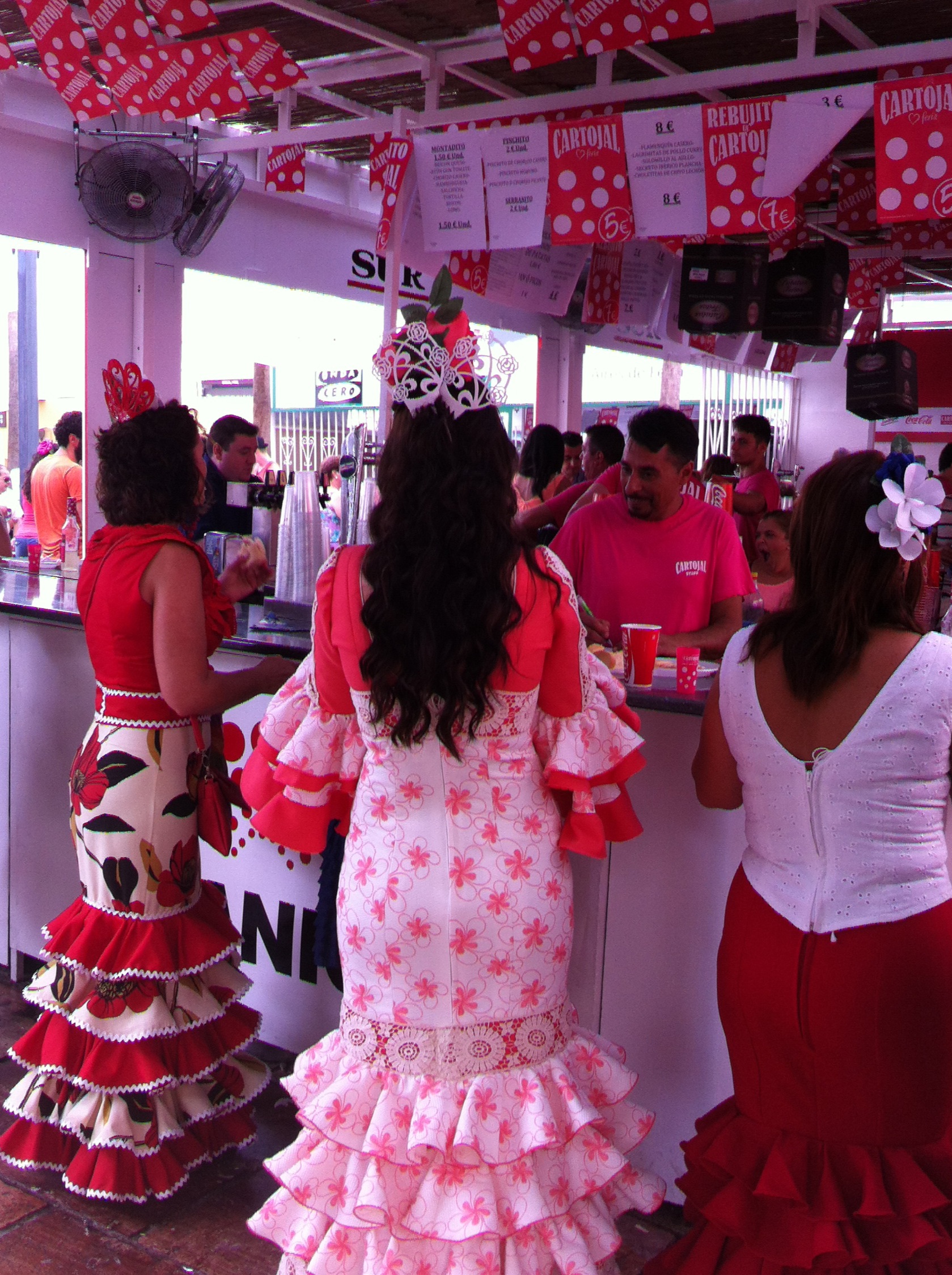 Of course there are lots of bars in the Plaza de la Constitución, and more pop-up bars in alleyways, plazas, and otherwise disused buildings. And some Portaloos in a side-street. The Ayuntamiento has organised the infrastructure. But there is little organised activity. Perhaps in la Plaza de los Flores there is a rota for the bands - it seems that people knew when the Free Soul Band was on (the plaza was packed for them). Or maybe there isn't a rota. Málaga feria has a delightful feel of just happening. Of course there are lots of bars in the Plaza de la Constitución, and more pop-up bars in alleyways, plazas, and otherwise disused buildings. And some Portaloos in a side-street. The Ayuntamiento has organised the infrastructure. But there is little organised activity. Perhaps in la Plaza de los Flores there is a rota for the bands - it seems that people knew when the Free Soul Band was on (the plaza was packed for them). Or maybe there isn't a rota. Málaga feria has a delightful feel of just happening.
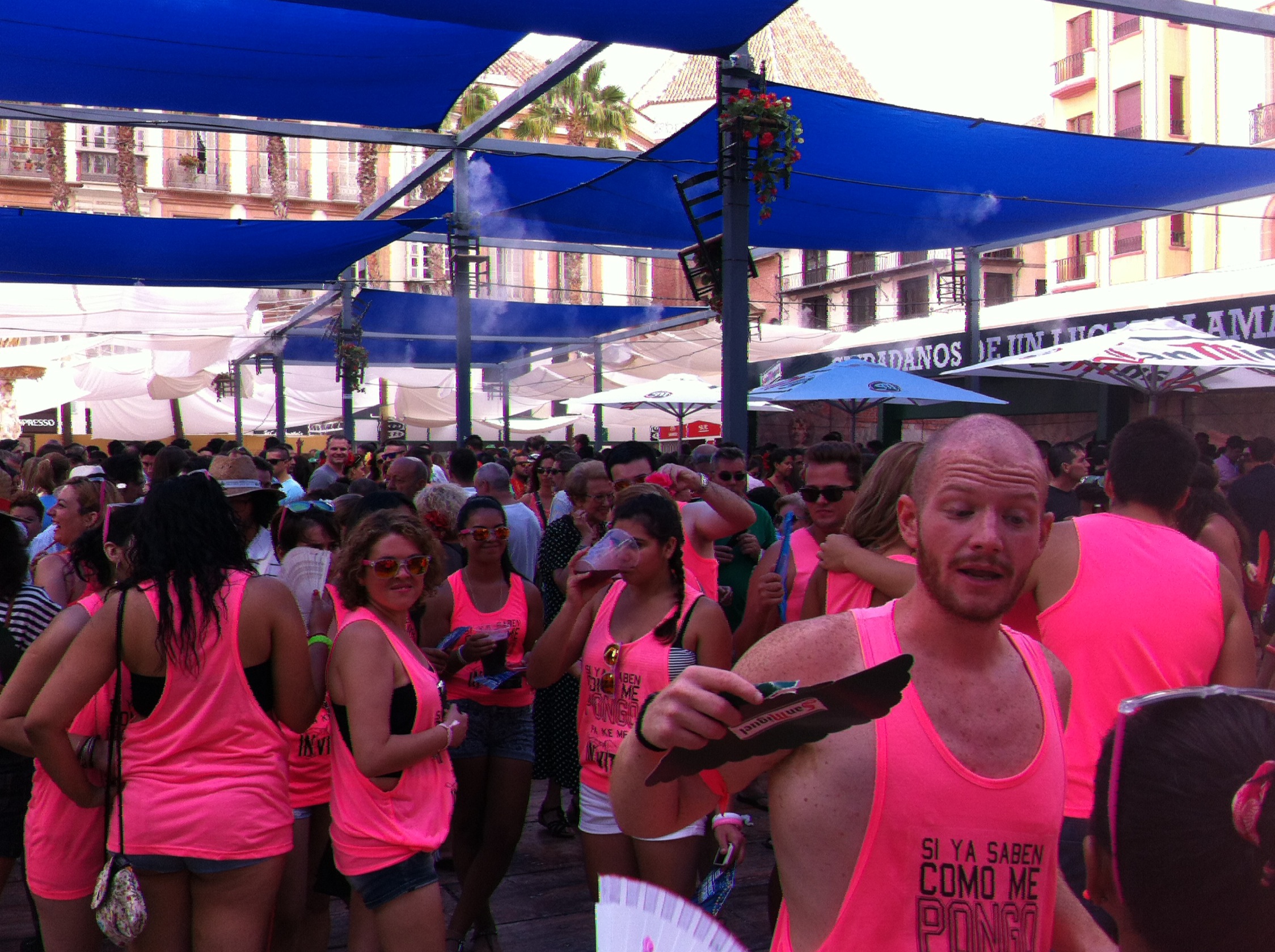
Numerous groups of youngsters have made "uniforms". Matching t-shirts, or matching hair-decorations. Not to perform, just to be noticed and perhaps to find each other in the crowds. Groups of ladies have rehearsed, and find a space to dance flamenco. The city is on holiday and everyone is in the centre taking part, even though "taking part" simply means being there.
We meet a friend, stop for coffee, meet another, move on for something to eat. Nothing fixed, nothing planned. We drop in at a caseta we'd enjoyed the year before, dance a little, take photos of strangers who take photos of us.
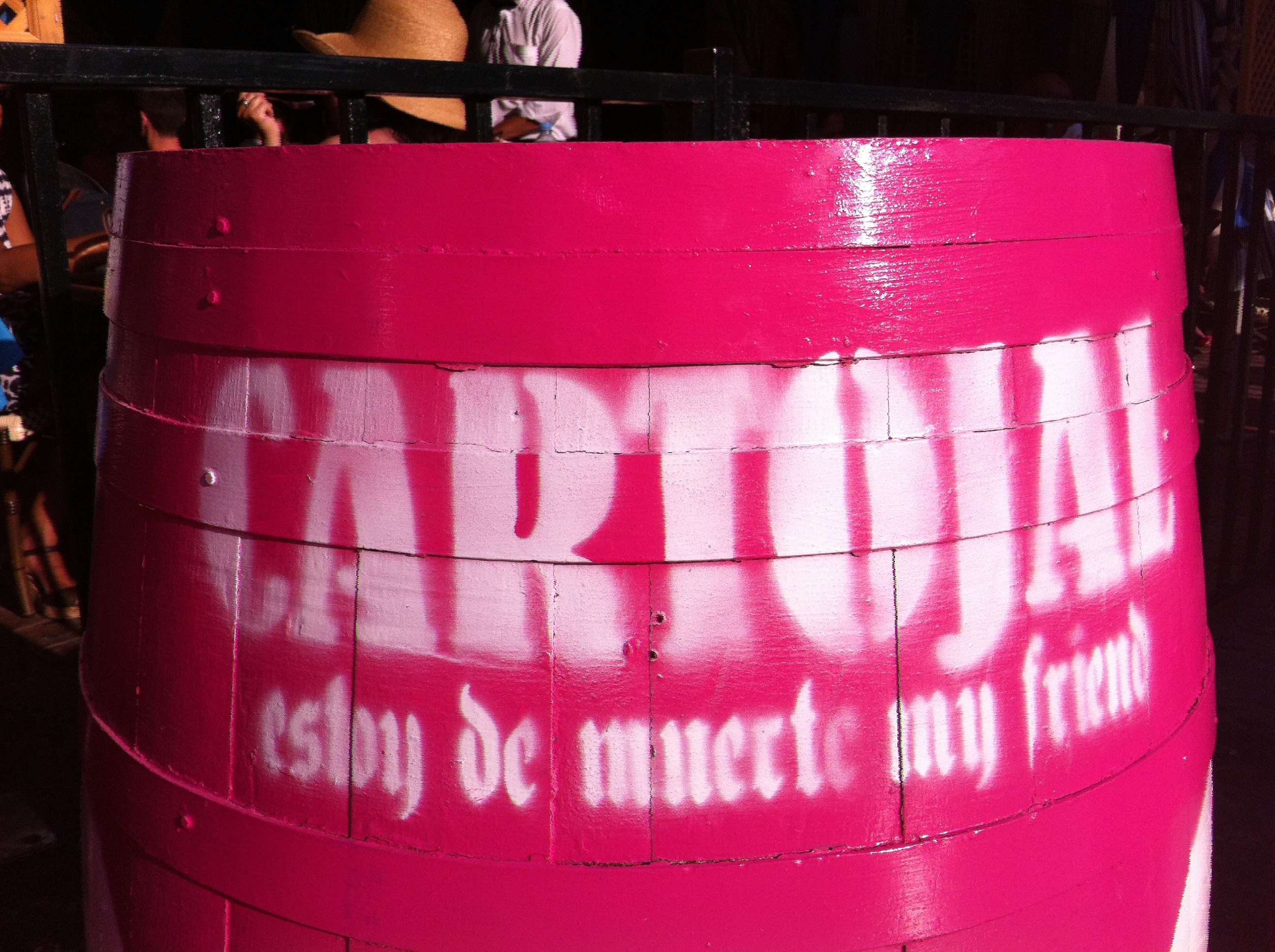 And everywhere, pink barrels, pink banners, pink Cartojal bottles of Málaga wine. Pink dresses, pink children, pink everything. And everywhere, pink barrels, pink banners, pink Cartojal bottles of Málaga wine. Pink dresses, pink children, pink everything.
This is feria. Malagueños do not need a programme of events, a running order, a plan. All they need is to be told "This is your week, this is your feria." The ayuntamiento enables the feria, but the people are the feria.
And as though the oxygen is turned off, suddenly at 6.30pm the street-cleaners emerge to sweep up the countless bottles and to water down the paved streets, now sticky with spilt beer and wine. The musicians pack up, and the beer pumps are turned off. The crowds disperse, many to catch the buses out to the recinta for the night feria, where they will continue to dance, eat and drink until 5am. Many simply wander home, and others head off to a favourite restaurant. 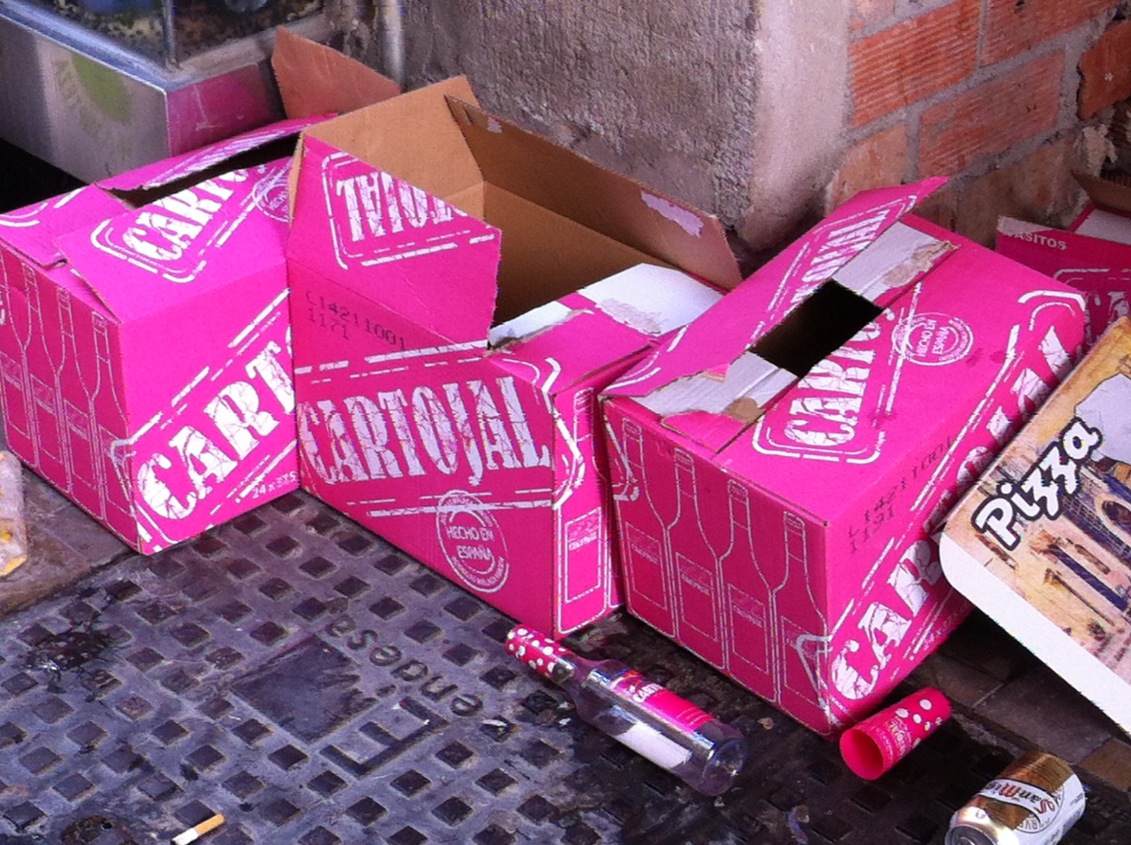 It's still Málaga, it's still a holiday, but it's not the feria any more. That moves now to the fairground out towards the airport (see last year's article). But here, in the centre, it is quiet, it is over until tomorrow. The police watch the last of the bands load their van, and the bars stack the empty pink wine-boxes more or less neatly for collection. The clean-up continues, the pink people drift off, and over the cathedral the sky turns pink, joining the colour scheme of feria. It's still Málaga, it's still a holiday, but it's not the feria any more. That moves now to the fairground out towards the airport (see last year's article). But here, in the centre, it is quiet, it is over until tomorrow. The police watch the last of the bands load their van, and the bars stack the empty pink wine-boxes more or less neatly for collection. The clean-up continues, the pink people drift off, and over the cathedral the sky turns pink, joining the colour scheme of feria.
© Tamara Essex 2014 http://www.twocampos.com
 0
Like
Published at 10:44 PM Comments (4)
0
Like
Published at 10:44 PM Comments (4)
114 - Vete a Dormir (Go to Sleep)
Thursday, August 14, 2014
 Twenty-five years ago I crawled out of a tent in the Sinai Desert at midnight, hoicked my rucksack onto my back, and followed our camels in the age-old pilgrimage from St Catherine’s Monastery to the summit of Mount Sinai. You climb it at night as it's too hot during the day. Plus the main point of the pilgrimage is to be on the summit as dawn breaks, and the extraordinary colours appear to rush towards you as the sun rises and picks out the layers of mountain-ranges spread out before you. Twenty-five years ago I crawled out of a tent in the Sinai Desert at midnight, hoicked my rucksack onto my back, and followed our camels in the age-old pilgrimage from St Catherine’s Monastery to the summit of Mount Sinai. You climb it at night as it's too hot during the day. Plus the main point of the pilgrimage is to be on the summit as dawn breaks, and the extraordinary colours appear to rush towards you as the sun rises and picks out the layers of mountain-ranges spread out before you.
And so in the small hours, in a similar pilgrimage, reminding me of that night 25 years ago, the villagers of Colmenar slowly and silently trudged up the hill to reach La Ermita (the chapel) perched atop the village and guarding over us. Shortly before 5am they gathered outside the Ermita, and moments later the fireworks exploded in front of them from the roof of the Casa de Cultura, to mark the end of the feria.
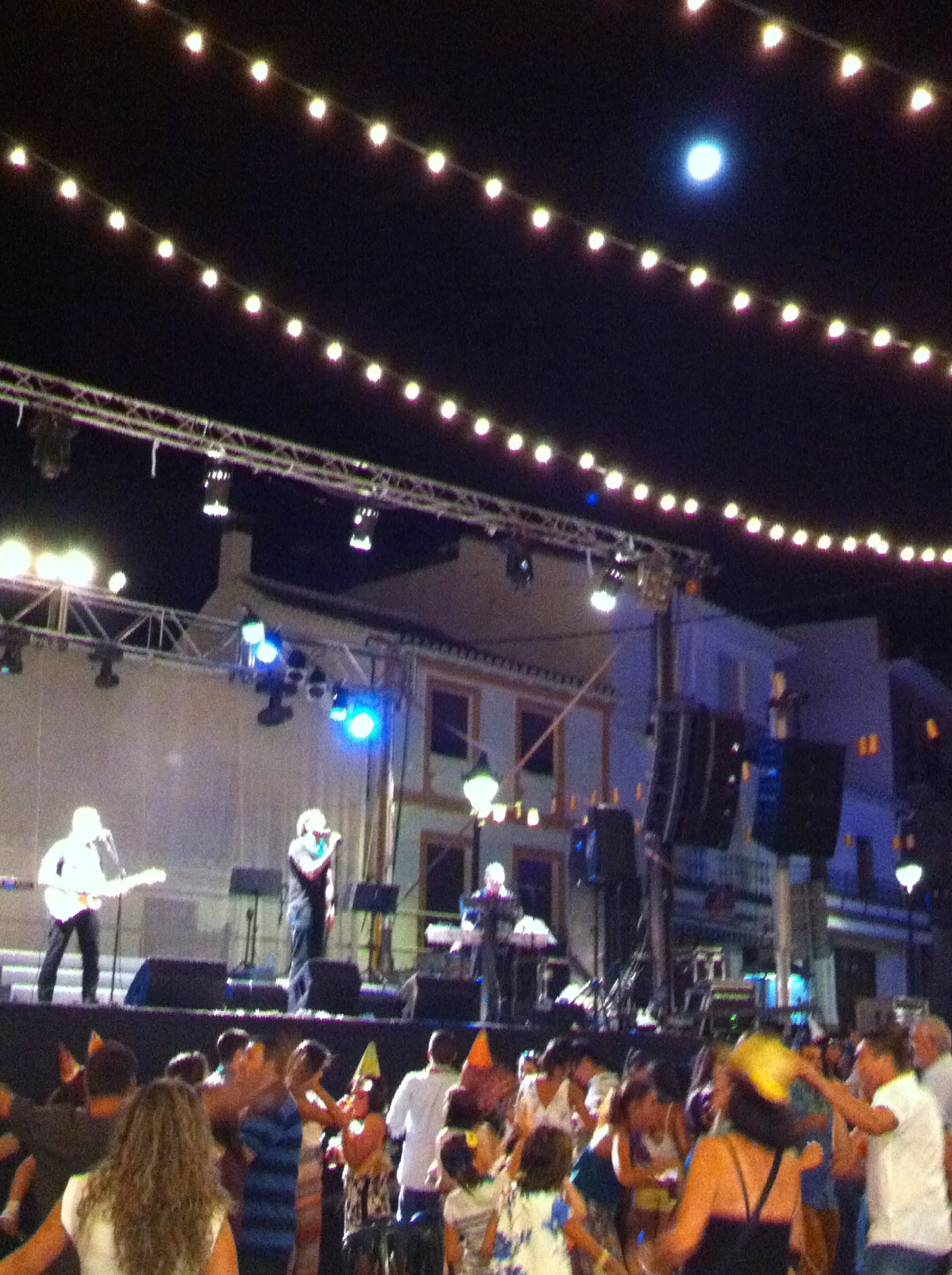 "They" gathered. Not "we" gathered. I just couldn't do it. The legs wouldn't move. Emma and I had danced, sung, taken the odd glass or two of something, and had five long and happy nights at the feria. And somehow in the same five days we'd fitted in a friend's wedding, I'd been to the beach for a midnight "soiree" with some crazy women friends, and Juan and I had each got a multa (a parking ticket) from the village policeman. And at the end of that, the legs simply said "enough". As groups of neighbours left their tables in the plaza to begin the climb, we looked at each other and just said "Pues, no." Even standing up felt impossible, let alone the trudge up the hill. For a small village, our highest point can sometimes feel an awfully long way away. "They" gathered. Not "we" gathered. I just couldn't do it. The legs wouldn't move. Emma and I had danced, sung, taken the odd glass or two of something, and had five long and happy nights at the feria. And somehow in the same five days we'd fitted in a friend's wedding, I'd been to the beach for a midnight "soiree" with some crazy women friends, and Juan and I had each got a multa (a parking ticket) from the village policeman. And at the end of that, the legs simply said "enough". As groups of neighbours left their tables in the plaza to begin the climb, we looked at each other and just said "Pues, no." Even standing up felt impossible, let alone the trudge up the hill. For a small village, our highest point can sometimes feel an awfully long way away.
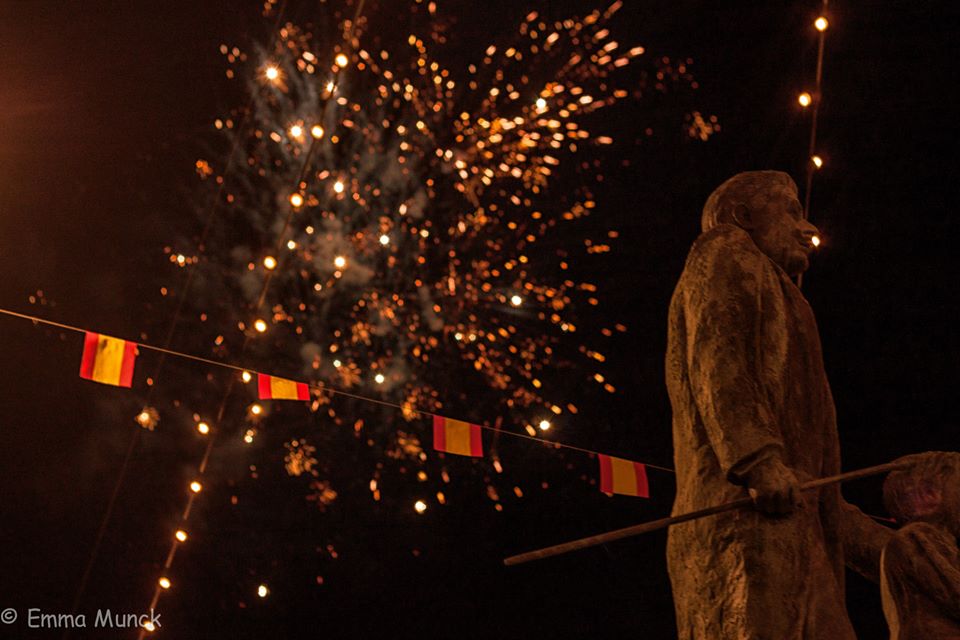
We stayed at our table, surrounded by empties and the remnants of chocolate and churros, the band continued to play, the hard-core villagers continued to drink, and the fireworks soared up above the stage, beside the Super-Moon, and over the head of the statue of Alfonso Molina Padilla, 19th-century son of Colmenar and benefactor to the orphans and students of the village.
Back in the late 1970s to the mid-1980s I worked in professional theatre, both repertory and touring shows. At the Theatre Royal, Windsor, the play changed every three weeks, and on the Saturday we'd do a matinee then an evening show, then begin the "strike" - not walking out on the job, but "striking" the set, deconstructing it, packing away the props, clearing the stage completely. It was an overnighter. Mid-morning on the Sunday we could help the 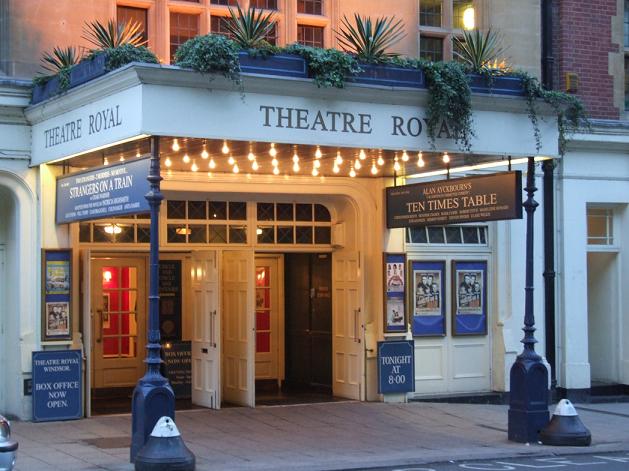 crew begin building the set for the next play, sliding the massive flats (walls or stage surrounds) from the workshop behind the stage, carrying furniture into place, while the lighting guys swung overhead rearranging the lights, and the big painted backdrops were lowered in from above, to provide a view of countryside, for example, outside a window that formed part of the stage scene. We stage managers then had to unpack the boxes of set dressing that had come from the props hire company, and decorate the set under the designer's guidance. If we were lucky we'd get to go home very late Sunday night to get a rest before an early start on Monday bringing in the props we'd been using in rehearsals and setting everything in its rightful place. Monday afternoon and the technical rehearsal began, often going on until well after midnight. When the actors left we had adjustments to make arising from the rehearsal, often having to change sound effects or props, and then another early start on Tuesday morning to prepare for the dress rehearsal at 2pm and the opening night at 7.30. It was exhausting, but we were young, and it was only every three weeks. The body coped. crew begin building the set for the next play, sliding the massive flats (walls or stage surrounds) from the workshop behind the stage, carrying furniture into place, while the lighting guys swung overhead rearranging the lights, and the big painted backdrops were lowered in from above, to provide a view of countryside, for example, outside a window that formed part of the stage scene. We stage managers then had to unpack the boxes of set dressing that had come from the props hire company, and decorate the set under the designer's guidance. If we were lucky we'd get to go home very late Sunday night to get a rest before an early start on Monday bringing in the props we'd been using in rehearsals and setting everything in its rightful place. Monday afternoon and the technical rehearsal began, often going on until well after midnight. When the actors left we had adjustments to make arising from the rehearsal, often having to change sound effects or props, and then another early start on Tuesday morning to prepare for the dress rehearsal at 2pm and the opening night at 7.30. It was exhausting, but we were young, and it was only every three weeks. The body coped.
Now I am old, but at least feria is only once a year. Except that's just Colmenar feria. Next week we have Málaga feria. And on top there is the village tapas route, fiesta de Candelaria, Semana Santa, Málaga Carnaval, Noche en Blanco, San Juan, Andalucía Day, and dozens more. Sigh.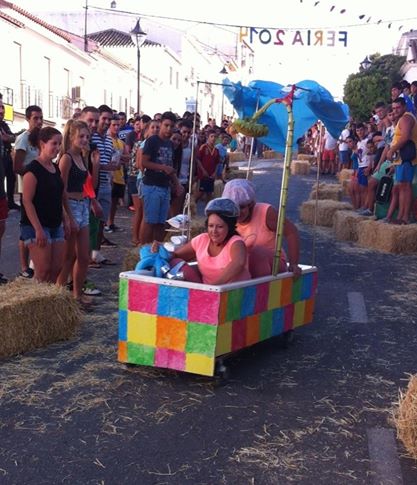
Plus it was hard to move, that Sunday night / Monday morning at 5am. There had been a LOT of free food. The Ayuntamiento (town hall) had done a splendid job, organising events for children, events for teenagers, free food, a horse show, concerts every night, sports events ranging from dominos to football, and the Coches Locos, the local version of Wacky Races.
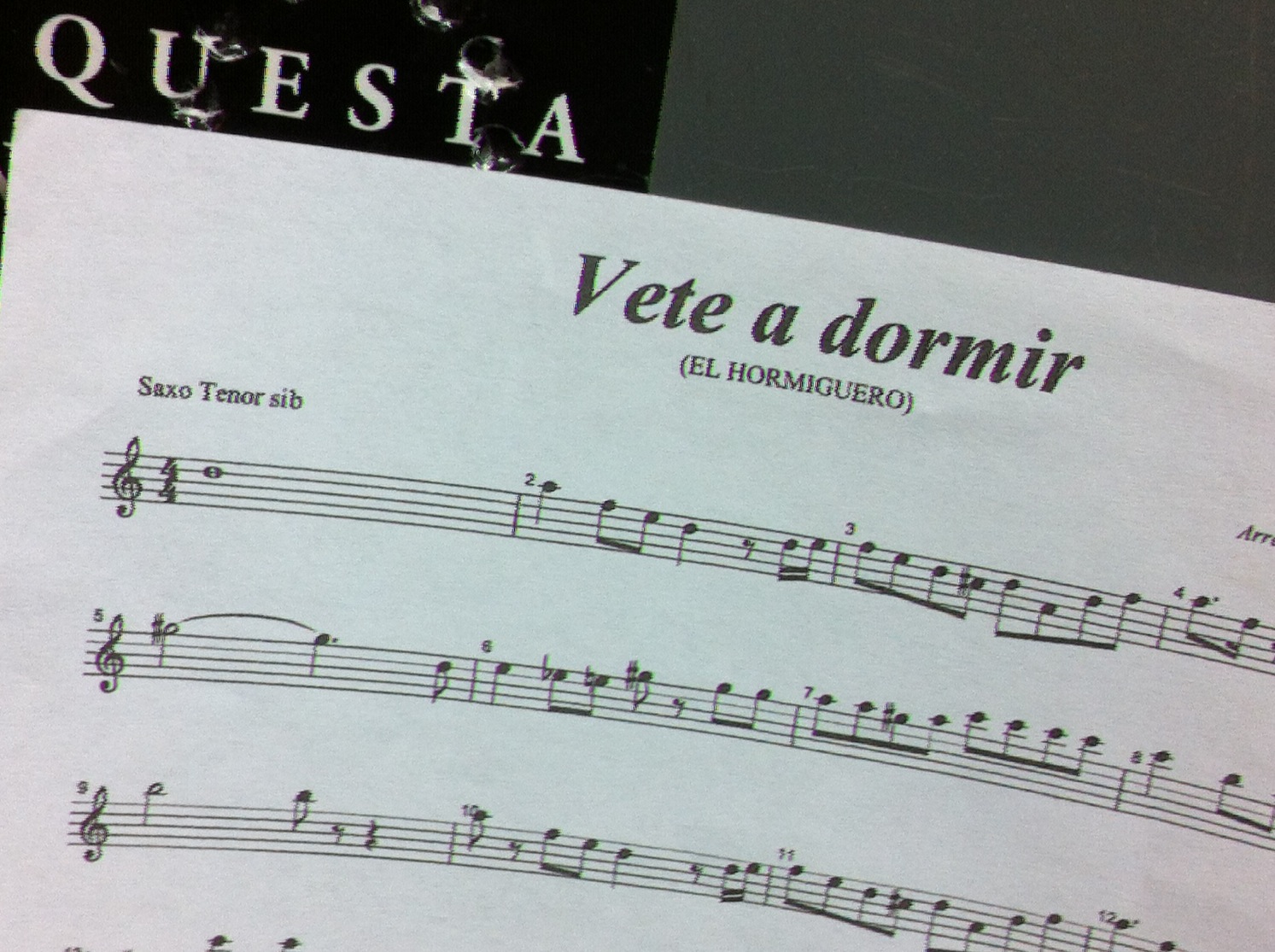 That Sunday, we had enjoyed enormous portions of exceptionally good paella. And while we were eating our paella, the town band played on. The song was "Vete a Dormir" - Go to Sleep. That Sunday, we had enjoyed enormous portions of exceptionally good paella. And while we were eating our paella, the town band played on. The song was "Vete a Dormir" - Go to Sleep.
Oh yes please, I need to. So very much …..
© Tamara Essex 2014 www.twocampos.com
THIS WEEK'S LANGUAGE POINT:
Oh dear. More “false friends”. Wouldn’t you think that “Por cierto” would translate to “For certain” … ie “Of course!” ??? Sigh. No it doesn’t. In fact it means “By the way”. A very useful phrase, but completely counter-intuitive.
To say “Of course” we can either say “Por supuesto”, or “Desde luego”. Odd, that second one, because it would literally translate to “From later” which makes no sense at all. I complained about this to Jose, who (with great restraint and total justification) pointed out to me that the English phrase “Of course” really makes no sense at all too, and certainly shouldn’t mean what it does!
I suppose he’s right (desde luego).
 1
Like
Published at 2:00 PM Comments (0)
1
Like
Published at 2:00 PM Comments (0)
113 - More Than A Foreigner
Thursday, August 7, 2014
Of course it's quite fun at first, isn't it? Being "the foreigner", having a bit of a laugh with neighbours about one's bad Spanish, apologising all the time, and realising that the sentence you can speak most fluently is "I'm sorry I don't understand." But there comes a point when that simply isn't good enough.
For me that tipping point came about a year ago when it occurred to me that although I got on well with my neighbours and we'd chat outside our doors long into the night on chairs perched precariously on our steep lane, they couldn't possibly know ME, the inside of me, the thoughts and experiences that have shaped me, the political principles that shape my actions. And, similarly, I couldn't possibly understand them in that way either. We got along fine, shared food and chats, borrowed and loaned cables and ladders, yet what interested each of us about the other was the foreign-ness, the differences. We regarded each other almost as specimens to be studied, with a degree of detachment.
And then there comes a point at which you need to communicate better. More deeply. As you get closer to friends and neighbours it becomes essential that they understand who you are, and that you in turn understand who they 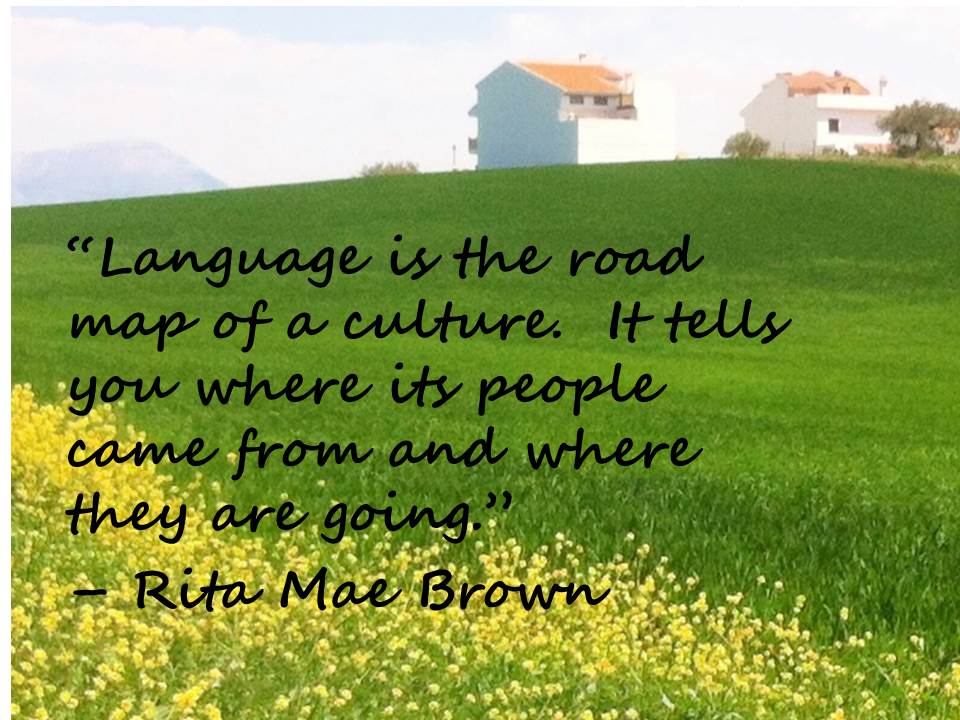 are. If not, they cannot really be called friends. In your country of origin, your FRIENDS are those who know your background, who know your sorrows and your delights, your achievements and your pain. They know what is important to you - what are the things for which you would stick your head above the parapet, what you would take to the streets over, and for what fundamental principle you would perhaps risk arrest. In your country of origin, people who do not know those things about you are acquaintances, casual friendships, not friends. In your country of origin, you mostly develop close friendships with people who share a not too dissimilar outlook on the things you consider important, whether those be the welfare state, wars around the world, bringing up children, views on the monarchy, immigration, or animal rights. are. If not, they cannot really be called friends. In your country of origin, your FRIENDS are those who know your background, who know your sorrows and your delights, your achievements and your pain. They know what is important to you - what are the things for which you would stick your head above the parapet, what you would take to the streets over, and for what fundamental principle you would perhaps risk arrest. In your country of origin, people who do not know those things about you are acquaintances, casual friendships, not friends. In your country of origin, you mostly develop close friendships with people who share a not too dissimilar outlook on the things you consider important, whether those be the welfare state, wars around the world, bringing up children, views on the monarchy, immigration, or animal rights.
So why would we accept any less in the relationships we build in a new home country? Clearly, to make "friends" without knowing people properly, or to call every acquaintance a friend, would be invidious. Moving to Spain is about more than sipping sangria by the pool, pleasant though that may be! Once we begin to "bed in", real communication becomes essential.
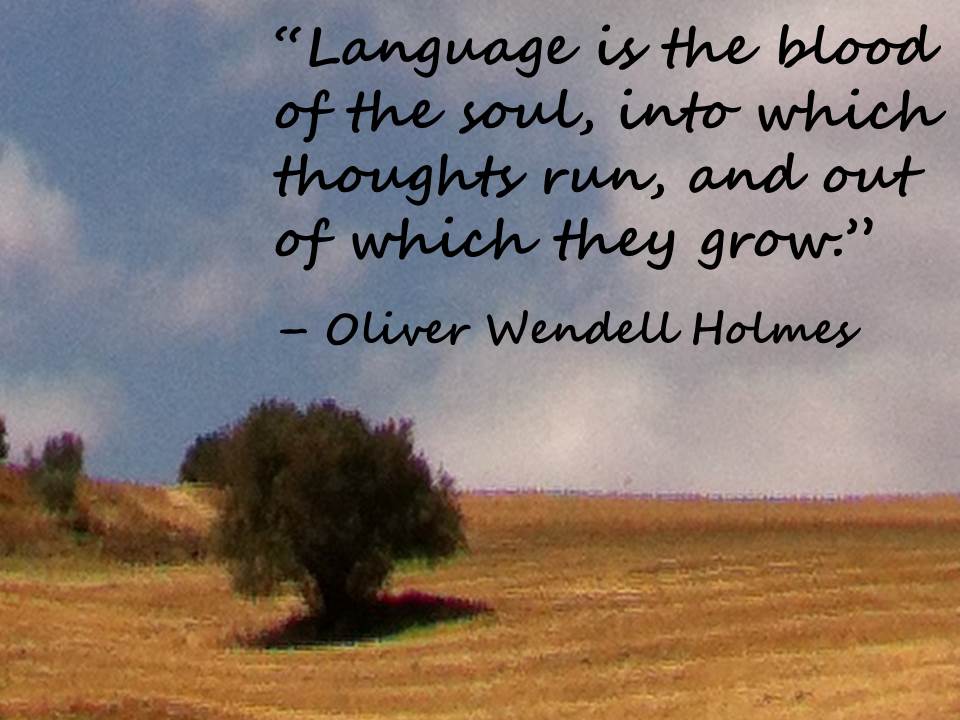
At the same time, we can begin to discover the beautiful richness of the Spanish language. In our own language, we choose our words carefully, we use light and shade, we hint at hidden meanings, we play games with words, and we recognise that what we know about a person influences how we hear and interpret the words they choose. That's complex stuff, learned through a lifetime of using the language, and through a lifetime of interpreting body-language against (usually) a shared context of background, education and environment.
Of course, learning a new language as an adult does not leave sufficient time to spend another entire lifetime understanding those nuances, nor to understand instinctively how a different background, education and environment shapes people. But we can do our best. Any relationship worth developing needs a level of understanding which can only be communicated through language.
There's a huge amount left to learn. Annoyingly, I still sometimes get mixed up between "ser" and "estar". There are common phrases that completely stump me and send me running to Jose or Adolfo for an explanation. And neighbours or workmen often have to repeat something for me. I have further layers of problems distinguishing when my Cuban, Venezuelan and Argentinian friends are using words or phrases specific to their countries.
But now I know the views and the worries of my friends and neighbours. One friend has fascinatingly complex views on the Spanish monarchy and almost contradictory thoughts about her own relationship with the church. Another 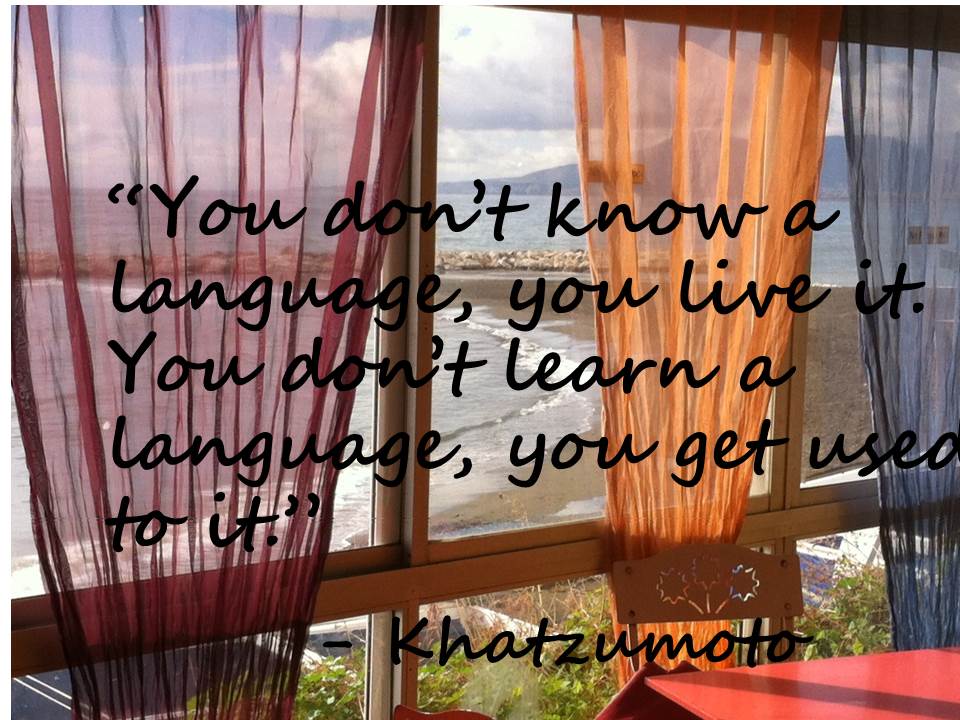 friend is passionate about an emerging left-wing political party here in Spain and we enjoy deep discussions about next year's elections here and about the forthcoming referendum in Catalunya. One "friend" was relegated somewhat, as our political differences emerged and became uncomfortable. I have a friend with whom I can (and do) talk about anything, however personal or controversial. With another, we wrestle with the complexities of human relationships. Most fun of all is learning to play with the language, use some of its richness, and to develop the ability to be me and to show my true self. friend is passionate about an emerging left-wing political party here in Spain and we enjoy deep discussions about next year's elections here and about the forthcoming referendum in Catalunya. One "friend" was relegated somewhat, as our political differences emerged and became uncomfortable. I have a friend with whom I can (and do) talk about anything, however personal or controversial. With another, we wrestle with the complexities of human relationships. Most fun of all is learning to play with the language, use some of its richness, and to develop the ability to be me and to show my true self.
The knock-backs still come, of course - frequently. Last night at the opening concert of Colmenar's feria I was chatting with one of my neighbours, someone I have always struggled to understand well. He slurs his speech at the best of times, and propping up the bar until 3am had done nothing to make him clearer! At one point I had to get him to repeat himself four times before the penny dropped. Communication, but faltering.
But most of the time, at last I can understand my friends and neighbours as the deep, complex, rounded human-beings that they are, not merely as "amusing Spanish neighbours with their quirky ways". And at last I can be confident that if people like me or want to spend time with me, it is because they know the real me. Playing the jolly foreigner, smiling and laughing and missing the point, is alright for a while, but it's not a mantle I would want to wear for long.
© Tamara Essex 2014 www.twocampos.com
THIS WEEK'S LANGUAGE POINT:
When is a female not a female? A sticky question in Spanish. The answer is .... When you give something to her! Or say something to her.
I saw her - La vi.
I gave her a present - Le di un regalo.
I told her what time it would start - Le dije a que hora lo comenzaría.
So she remains a female person (la) when we do something direct such as seeing her (she is the "direct object pronoun", if you like the grammatical terms!). But she becomes neutral (le) when we do something TO her such as giving something to her, telling her something, or buying something for her (she is the indirect object pronoun).
It helps to remember that if you say "to her" then she becomes "le", but we sometimes miss it out, as in telling her something (though technically we are telling it TO her).
Oh and then of course it can be necessary to clarify to whom you gave the present, so we have to add "A ella le di el regalo."
 0
Like
Published at 2:23 PM Comments (4)
0
Like
Published at 2:23 PM Comments (4)
Spam post or Abuse? Please let us know
|
|